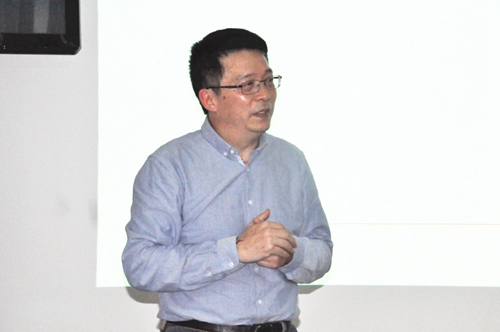
April 27, 2016, Chen Dake, physical oceanographer and academician of Second Institute of Oceanography, National Oceanic Administration, had a wonderful lecture entitled "Challenges and Perspectives of ENSO Research" at Peking University. The lecture was chaired by Professor Hu Yongyun, Director of Department of Atmospheric and Oceanic Sciences of School of Physics, Peking University.

Academician Chen Dake
Chen first reviewed the research history of ENSO and the progress of current domestic research, introduced the types and formation mechanism of ENSO phenomenon in the past decades, and put forward that the eruption of the equatorial westerly wind is the induction mechanism for the frequent occurrence of irregular ENSO extremes. Prof. Chen explained the interaction between ENSO and climate change during the global warming process. He also analyzed and summed up the predictability of ENSO with years of research experience and results, pointing out that the bottleneck of limiting the accuracy of ENSO prediction lies in the following four aspects: 1) the error of the model; 2) the imperfection of the observation system; 3) the error in the data processing technology; 4) the uncertainty of the initial condition. Furthermore, he systematically introduced the development direction of ENSO research.
Chen introduced the international observation plan implemented in the equatorial Pacific Ocean, includingthe earliest American Tropical Atmosphere Ocean (TAO) project, the Japanese Triangle Trans-Ocean Buoy Network(TRITON) project, and the upcoming TPOS stereoscopic observation network in China. He mentioned that as the early observation system in the US and Japan aging, the current international community is looking forward to China's corresponding responsibilities and obligations in the global ocean observing system. Academician Chen is actively participating in the formulation of relevant policies and research plans for the establishment of the deepwater / oceanic observation system, and proposes to establish the Western Pacific Cross Observation System that covers the waters of the Western Pacific and the South China Sea to carry out long-term observation of the El Nino, East Asian monsoon and typhoon. It is designed to be integrated into the international observation system and become a multidisciplinary observation platform, laying a solid foundation for laying the status of China's observation network in the world in the next two decades.

Chen Dake with Students
Finally, Chen looked forward to the broad prospects of the future development of marine disciplines in China and encouraged the young students of Peking University to actively participate in the marine science research.